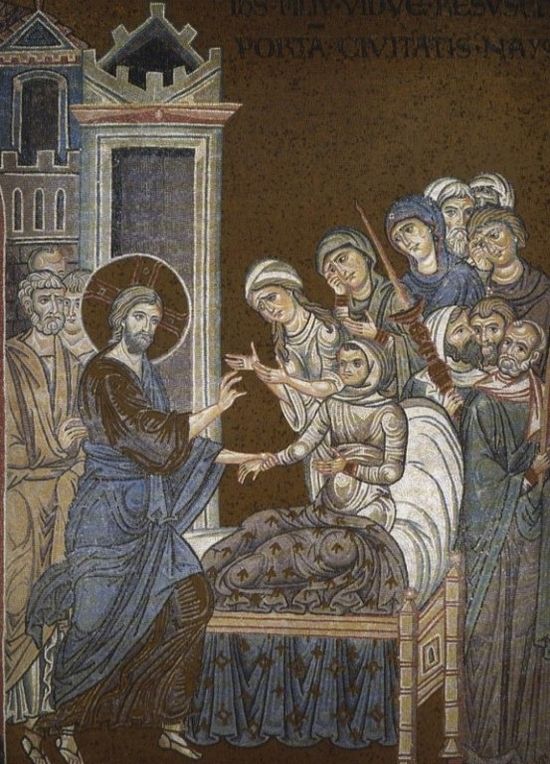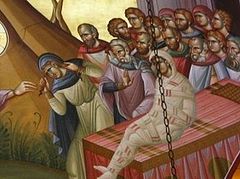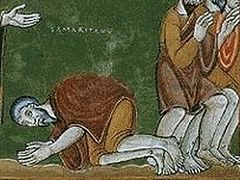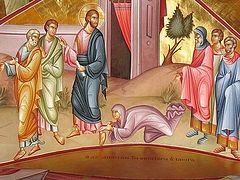Source: Hermitage of the Holy Cross
October 25, 2015

The Gospel reading for this Sunday, the story of the widow of Nain, is very brief; yet like every passage of Holy Scripture, it contains many layers of meaning, each of them true, none of them superseding nor contradicting one another, but all blending into a chorus of divine truth that even contains within itself everything that we need to know about the Kingdom of God and our life on this sinful earth.
Christ, the Giver of Life, comes to the gates of the city of Nain, and there meets a funeral procession. Our Lord approaches us and our broken world, and immediately and above all He meets with death and profound sorrow. He meets the corpse, not of one gray-haired and full of years, but of a young man, a youth with his life tragically cut short before it had even really begun. And He meets a mother, totally alone, with no husband and no child but the dead boy only. He meets a widowed humanity, with its hope for the future now lying dead on a bier and about to be cast once more into the cold earth from whence it had been taken so many centuries ago in Eden, in a Paradise that this widowed humanity can no longer remember, nor even see any reason to believe exists.
The Holy Fathers tell us that the widow in today’s Gospel is the soul, cut off from her husband, the Word of God. The son of the widow is the mind, slain by sin and being carried out from the city, which is the Heavenly Jerusalem, the land of the living. The bier is the body which is our tomb, living in death before our death.
There are many spiritual lessons here, there are many important truths which the Holy Spirit has spoken to us by the mouth of the Holy Apostle and Evangelist Luke. Yet above all, let us look today at weeping of the widow.
St. Isaac the Syrian, when asked what work a monk should occupy himself with when secluded in his cell, replied that there is only one task that can possibly occupy a monk who is truly seeking his salvation: to weep constantly for his soul, slain by sin. To look honestly at ourselves, to not only acknowledge but to truly and vividly see and to weep over the sin, death and corruption that is within us, is the chief task in life not only for the monk but for every Christian. But Adam and Eve hid their nakedness in the Garden with fig leaves and they hid from the voice of God, and we, their sons and daughters, have occupied ourselves with nothing else from that time on.
The world today is overflowing with ways to hide our nakedness, our spiritual death, from ourselves and from one another. We can distract ourselves through entertainment, through work or sports standings, through romance, through drugs or sex or fine dining. We can recreate ourselves in any image of our choosing through clothing, through exercise or diet pills, through Facebook profiles or through plastic surgery. We can define our tastes, our opinions, our political party or our gender. And we can even, if we choose, wear the mask of piety; we can define ourselves by our prayer rules, our fasting, our impeccable church attendance and our strict observance of all the church canons. In short, we are given every tool at the devil’s disposal to prevent us from ever really coming to know our true self. And we are eager to do the devil’s work in hiding from ourselves, because we know deep down that we will not like what we see. Nobody wants to look into their heart when they know that they will only see a corpse.
And yet our Savior has told us: “blessed are they that mourn.” Not because the Lord wants us to be downcast, guilt-ridden and tormented, but because it is only those who mourn that shall be comforted. It is only those who see the truth about themselves who are capable of being changed. Had the widow stayed at home and drowned her sorrow in a bottle, or fled to a distant land in search of a geographical cure, she would not have met her Lord; it was by standing next to the bier and weeping that she received her dead son restored to life. For it was precisely because of His compassion for the widow, the Gospel tells us, that the Lord was moved to raise the young boy again to life.
And this is an extremely important point in today’s Gospel story. The Lord did not raise the young boy for his own sake, so that he could live a full and happy life in this world, taste of its varied pleasures and delights, marry a beautiful wife and raise a family, achieve a successful career and finally enjoy a peaceful retirement before going the way of all flesh.
No. The Lord raised the young boy for the sake of his mother.
And this is not some sort of incidental, negligible detail in the Gospel story. All throughout His earthly ministry, the Lord was constantly working miracles, healings and resurrections – and even forgiving sins – for the sake of those who loved the one whom He healed. We see it again and again – in the centurion and his servant, the ruler of the synagogue and his daughter, the paralytic who was born of four, and in the resurrection of Lazarus the Four Days Dead for the sakes of Mary and Martha.
So let us remember that for us too, our resurrection—both the spiritual resurrection and the bodily—is not given to us for our own sake, but for the sake of those around us: those who love us, those who pray for us, and also for the sake of those who hate us and do us wrong. Above all, our resurrection is given to us for the sake of our own mother, the Holy Church of Christ, so that we can become truly Her faithful children. For the Fathers also tell us that the young boy who sat up and spoke after the Lord raised him in today’s Gospel symbolizes the Christian who speaks instruction and edification to those around him after his return from spiritual death. Though this might, for some of us, take the form of words, for each and every Christian it can and must be made manifest in our deeds, in our way of life, and above all in the love that we have for one another, the love by which the Lord said that all men will know that we are Christians, and which love is, in the end, the true and only Resurrection.
May the Lord God grant to all of us this love, that same divine and deifying love for the sake of which our Savior became incarnate and was crucified and raised again in glory in order to give to us sinners, that very same love which is shared between the Lord Jesus Christ Himself and His Father Who is without beginning and His all-holy and good and life-creating Spirit, to Whom be all glory, honor and worship, now and ever, and unto the ages of ages. Amen.



